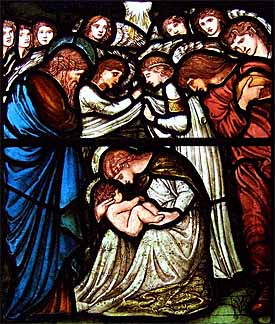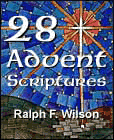
|
Old Testament
New Testament
Gospels
Acts
Paul's Letters
General Letters
Revelation
Topical Studies
Beginning the Journey (for new Christians). en Español

|
Old Testament
New Testament
Gospels
Acts
Paul's Letters
General Letters
Revelation
Topical Studies

|
Home
Bible Studies
Articles
Books
Podcasts
Search
Menu
Donate
About Us
Contact Us
FAQ
Sitemap
Day 6. For unto Us a Child Is Born (Isaiah 9:6)
Friday, First Week of Advent
 Edward Burne-Jones (1833-1898, 'Nativity' (1875), William Morris stained glass window, St. Martins in the Bull Ring, Birmingham city center, south window. |
We know that the personage Isaiah introduces in verse 6 is the Messiah, since verse 7 clearly states that "he will reign on David's throne and over his kingdom" (See Day 7). But this is clearly no human child. Since he is described as "mighty God, everlasting Father," it becomes obvious that he is a divine Child.
"For to us a child is born,
to us a son is given,
and the government will be on his shoulders.
And he will be called Wonderful Counselor,
Mighty God, Everlasting Father, Prince of Peace" (Isaiah 9:6)
When will he come? How will it happen? We're not given all the details here, but we are assured that Yahweh Almighty will bring it to pass in his time.
Let's look at the titles of this Son:
Wonderful Counselor
"Counselor" is yāʿaṣ, "advise, counsel, purpose, devise, plan." In Isaiah 11:2 we're told that the "Spirit of counsel" will rest upon this Messiah. Thus, "the child who is to come, on whose shoulders the government of the world shall rest, is one whose plans, purposes, designs and decrees for his people are marvelous."25 "Wonderful" is peleʾ, "wonder." "In the Bible, the root plʾ refers to things that are unusual, beyond human capabilities. As such, it awakens astonishment in man."26 This Son will possess counsel to be wondered at, as the wisdom of Solomon amazed people in his day (1 Kings 3:28). Do you listen carefully to Him for your counsel?
Mighty God
"God" is the generic ʾēl, "god, divine being." "Mighty" is gibbôr, "mighty, strong, valiant, mighty man," often referring to the heroes or champions among the armed forces.27 Together the words may mean something like "Warrior God," or perhaps "Hero."28 This Child is identified with Yahweh himself. Sometimes we think of "gentle Jesus, meek and mild."29 But this figure portrayed here is a powerful, active, militant conqueror. My mind goes to John's vision in the Book of Revelation where Jesus appears as Conqueror:
"11 I saw heaven standing open and there before me was a white horse, whose rider is called Faithful and True. With justice he judges and makes war.... 13 He is dressed in a robe dipped in blood, and his name is the Word of God. 14 The armies of heaven were following him, riding on white horses and dressed in fine linen, white and clean. 15 Out of his mouth comes a sharp sword with which to strike down the nations. 'He will rule them with an iron scepter.' He treads the winepress of the fury of the wrath of God Almighty. 16 On his robe and on his thigh he has this name written: KING OF KINGS AND LORD OF LORDS." (Revelation 19:11, 12-16)
Here we see the Mighty Warrior in all his strength and glory. (More on the Mighty Warrior on Day 10.)
Everlasting Father
Father is ʾāb (as in "Abba, Father"). We see God referred to as "Father" only twice more in Isaiah (63:16; 64:8). In addition, there is a scattering of references elsewhere in the Old Testament,30 but in Jesus' mouth, "Father" is common. Here he is not only Father, but "Everlasting31 Father," one who is always alive -- past, present, future.
If "Everlasting Father" refers to Jesus, how can he be both the Son and the Father? "Son" and "Father" are used as technical terms in the New Testament as well as our doctrine of the Trinity. To import them back into Isaiah and expect them to be used in exactly the same way is asking too much. The point that is made here, however, is that this Child, this Son, will be divine -- he is very closely identified with Yahweh himself. That is the theological sense. But in a functional sense, Young notes that, "he is the one who is eternally a Father to his people. Now and forever he guards his people and supplies their needs."32 The concepts of fathering and shepherding a people are very close to each other. Jesus' statement, "I am the Good Shepherd" (John 10:11, 14) captures the heart of this idea.
Prince of Peace
"Prince" is śar, not the son of a monarch, but a chief leader: "prince, chief, captain, ruler, governor, keeper, chief captain, steward, master."33 "Peace" is shālôm. "The general meaning behind the root sh-l-m is of completion and fulfillment -- of entering into a state of wholeness and unity, a restored relationship," encompassing the ideas of "peace, prosperity, well[ness], health, completeness, safety."34 So the "Prince of Peace" is the chief bringer of reconciliation, peace, fulfillment, and wholeness. He is master of this entire realm. If you want an all-encompassing peace, you come to him. We'll see what this peaceful kingdom is like on Day 13 (Isaiah 11:6-10).
Isaiah has been talking about the horrors of war:
"Every warrior's boot used in battle
and every garment rolled in blood.... (Isaiah 9:5a)
 Also available in book formats: PDF, Kindle, and paperback. |
The time of war that has culminated in breaking the yoke of the oppressor from Israel's shoulders. God's people have been troubled, but he is sending a Son, a divine Child, the Messiah, who will restore his people fully.
"For to us a child is born,
to us a son is given,
and the government will be on his shoulders.
And he will be called Wonderful Counselor,
Mighty God, Everlasting Father,
Prince of Peace." (Isaiah 9:6)
This is the Child whom Mary cradled in her arms and sang to sleep. This Child is Jesus!
Prayer
Father, we marvel that the tiny child in Mary's arms is this Wonderful Counselor, this Mighty God, this Everlasting Father, this Prince of Peace. How can it be? So tiny and yet so powerful! Jesus, keep me from trying to lower you to my level as a buddy, an equal. Rather let me honor you in all your majesty. I am amazed that you have chosen to call me "friend." In this wonder, I pray, in your holy name. Amen.
Discussion Question
Q6. (Isaiah 9:6) Paraphrase in your own words the
amazing titles given to Jesus in Isaiah 9:6. How should knowledge of his titles
affect our relationship to him?
https://www.joyfulheart.com/forums/topic/2080-q6-child/
Endnotes
[25] Paul R. Gilchrist, yāʿaṣ, TWOT #887.
[26] Victor P. Hamilton, pālāʾ, TWOT #1768a.
[27] John N. Oswalt, gābar, TWOT #310b. It is from the verb gābar, "prevail, be mighty, have strength, be great." The Hebrew root is commonly associated with warfare and has to do with the strength and vitality of the successful warrior.
[28] Young says gibbor simply means "hero" (Young, Isaiah 1:337). "He who is born the mighty God is therefore able to save all those who put their trust in him." (Young, Isaiah 1:338).
[29] "Gentle Jesus, Meek and Mild" is the title and beginning line of a hymn penned by Charles Wesley in 1742.
[30] Deuteronomy 32:6; Jeremiah 3:19; 31:9; Malachi 2:10; Psalm 89:26.
[31] "Everlasting is ʿad, "perpetuity, continuing future" (TWOT #1565a).
[32] Young, Isaiah, 1:339.
[33] Śar, TWOT #2295a.
[34] G. Lloyd Carr, shālôm, TWOT #2401a.
Copyright © 2025, Ralph F. Wilson. <pastor![]() joyfulheart.com> All rights reserved. A single copy of this article is free. Do not put this on a website. See legal, copyright, and reprint information.
joyfulheart.com> All rights reserved. A single copy of this article is free. Do not put this on a website. See legal, copyright, and reprint information.

